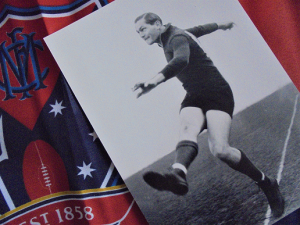Jack Mueller – The Unrivalled Colossus
Nigel Dawe
Nigel Dawe

The early Greek, pre-Socratic thinker Heraclitus once said: “No man ever steps into the same river twice.” Well, he never met the #12 wearing Jack Mueller, the greatest big game player in the history of not just our club, but the entire sport. (A claim that won me an Encyclopedia of AFL Footballers about 20 years ago, when Inside Football magazine ran a competition under the banner: ‘Mr September – Who is the greatest September specialist of all-time?)
Thus, in one of the most incredible feats in football, Mueller kicked 8 goals in both of the prelim finals of 1946 and 1948 against Collingwood (both times), the following week (that being the Grand Final of each season) he kicked 6 goals against Essendon (both times), while Melbourne fell short of victory in ’46, they eventually triumphed in ‘48 (after the first game was a draw) and to script, Mueller put through 6 goals the following week in the Grand Final ‘replay’. Amassing a club record 20 majors in the one finals campaign.
And so, that’s the numbers caroled and crunched for just these two seasons, the bigger picture paints an even more breath-taking fresco. Overall, Jack Mueller scored 62 goals in the 18 finals he played for the club, which is nearly twice as many as the next placed player and teammate Norm Smith, who kicked 36 majors in finals matches. It was also a rather ominous sign, not to mention poetically fitting, that Jack Mueller was born on the 9th of September, 1915.
If all the above were not enough to score me that encyclopedia, then comparing Jack’s record to anyone you want to name in the history of the game in finals, practically addressed the envelope from Inside Football for me.
Because Mueller, incredibly featured in Melbourne’s top two best players on nine occasions in which he entered the finals fray, no-one comes even close to this level of impact or dominance: to say that he was a big game player borders on an outright understatement.
Keeping in mind, that the Echuca-born Mueller, who debuted in 1934 was an absolute linchpin in the Melbourne premiership sides of 1939-40-41, and had club best & fairest winning seasons in 1937, ‘39 and ‘46, proof that he was performing consistently high at an elite level for well over a decade; all with two fingers practically missing and a third badly damaged as a result of a work related accident that he sustained after having only played his first season of senior football.
To put Jack Mueller and his playing era into full context and perspective, no less than Norm Smith is on the record as having stated the Melbourne side of 1940 was the greatest team he ever saw (having grown up a magpie fan and seeing the record setting 4-peat Collingwood sides of the late ’20s and of course coaching the Demons in the ‘50s and ‘60s, such a call from Smith is perhaps the most definitive and informed of anyone in the history of the game).
Little wonder then, Mueller played in all 21 games of that history making 1940 season, a year that also saw the team score over 100 points in a club record 16 games, one of which – the round 10 match against Geelong remains our team’s highest ever ‘losing’ score. Incredibly that day the Demons lost (given the chance of winning with a kick after the siren by Ron Barassi Snr that unfortunately drifted through for a behind) but the final score was 22.19 (151) to Geelong’s 24.10 (154).
From a numbers perspective, the ultimate reflection of the Demons of Mueller’s day can be gained when you see how they stack up against the club’s golden boys of the ‘50s; and incredibly of the 61 games Melbourne played between 1939 and ‘41 the side kicked a score of over 100 points on 46 occasions, compared to the 42 times during the entire 141 games played between 1954 and ‘60.
If that weren’t distinguishing enough, then consider the club record statistic of six consecutive finals match wins between 1940-46 and you start to get a sense of just where Mueller and the sides he played in, reside within the overall history and soul of the club.
It’s also quite heart-warming to think that right up until the end of his life, apparently every time Jack Mueller walked into the MCG his eyes would fully light up and he’d always say something along the lines: “Ah, I’ve arrived home again!” If that doesn’t say how much this man utterly belonged on the big stage, then I don’t know what does. Relatedly, he earned the nickname ‘Melba’ (after the opera singer Dame Nellie Melba) because like her, he’d keep coming out of retirement for that ‘one final performance.’
And so, when it comes to conveying the legend and gleaming legacy of the one-out and one-off type of player that Jack Mueller was, it is quite the tension-fraught task to know exactly where to either start or finish; but an insight that best suffices for the later is a comment, albeit glowing endorsement made by Richmond’s ‘Captain Blood’ Dyer, whereby he once simply said:
“Mueller was the colossus of the football field. Many of the greatest players the game has produced have declared him the most outstanding player Australian Rules has seen… Big Jack was the devil himself. You could search the world and not find a better Satan. He personified arrogance, an easy going self-confidence by which he radiated authority over all he surveyed.”